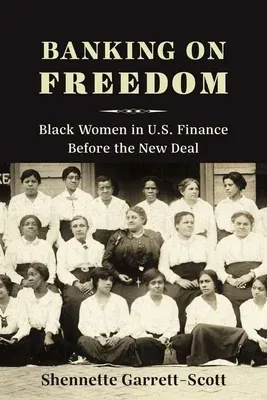Shennette Garrett-Scott
(Author)Banking on Freedom: Black Women in U.S. Finance Before the New DealHardcover, 7 May 2019

Qty
1
Turbo
Ships in 2 - 3 days
In Stock
Free Delivery
Cash on Delivery
15 Days
Free Returns
Secure Checkout

Part of Series
Columbia Studies in the History of U.S. Capitalism
Print Length
288 pages
Language
English
Publisher
Columbia University Press
Date Published
7 May 2019
ISBN-10
0231183909
ISBN-13
9780231183901
Description
Product Details
Author:
Book Format:
Hardcover
Country of Origin:
US
Date Published:
7 May 2019
Dimensions:
23.11 x
15.24 x
2.29 cm
ISBN-10:
0231183909
ISBN-13:
9780231183901
Language:
English
Location:
New York
Pages:
288
Publisher:
Weight:
544.31 gm